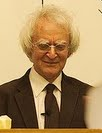Jerry (G.A.) Cohen has died
 [Thanks to Stephen Marks for most of the links below]
[Thanks to Stephen Marks for most of the links below]
Professor Cohen, ‘Jerry’ to very many, has been Chichele Professor of Social and Political Theory, All Souls College, Oxford. He has been both a worthy successor to Isaiah Berlin in the chair and also his own man. Born into a Jewish family in Montreal, Cohen was educated at McGill University and then in Oxford under Berlin and Gilbert Ryle. He taught philosophy vigorously at University College London and became known as the first proponent of analytical Marxism. His resolute book illustrative of that way of thinking is Karl Marx’s Theory of History: A Defence. Cohen has not been imprisoned by it, as his subsequent writings make clear — Self-Ownership, Freedom, and Equality and If You’re An Egalitarian, How Come You’re So Rich? He was also a JfJfP signatory.
See Prof Michael Rosen’s warm account of the funeral here.
‘Proof of the catholicity and openness of British philosophy is that it could embrace and heap the highest of its academic honours upon a maverick such as Jerry Cohen, writes Paul Levy in his obituary in the Independent.
‘Jerry Cohen was one of the liveliest and most imaginative minds — and wittiest lecturers — in the international philosophical community’ says the Times; ‘arguably the leading political philosopher of the left’ says Jane O’Gray in the Guardian; Jerry was ‘quite brilliant at striking the right balance between the discipline of following the argument where it leads and the importance of hanging onto one’s deepest convictions’ says Chris Bertram on Crooked Timber; he was, writes Gerald Dworkin,’one of the most distinguished political philosophers of my generation. He was also an extraordinary person whose kindness, wit and integrity will be remembered as much by those who knew him as his intellectual brilliance.’
You can get a flavour of his writing, and his passions, in a paper inspired by Zvi Stauber, Israeli ambassador to the UK’s condemnation of Palestinian terrorism in 2003 Casting the first stone: who can, and who can’t condemn the terrorists? (and of his personal attitudes in a brief ‘Appendix: Israel and me’).
There are ‘more remembrances’ with links to other blogs here; and more links on this philosophy blog.
Here’s a tiny bit of info:
Jerry was born in 1941. He describes his childhood as follows: ‘My parents were Jewish factory workers in Montreal who met in the course of struggles to build unionism in the garment trade, in the face of (literally) brutal boss and police repression. When I was four years old, they enrolled me in the Morris Winchewsky Yiddish School, which was run by a communist Jewish organization. It was the only school I attended until I was eleven, when raids by the ‘Red Squad’ of the Province of Quebec police on the premises of the organization and on the school itself made it impossible for the school to continue.’
___
And here some extracts from an article by Rabbi Eli Brackman on the Oxford Chabad Society website:
Another major aspect of change in Jerry’s life is his attitude towards Jewish tradition. As a child brought up in a Jewish communist home, he practiced a secular version of Judaism. His family observed the holidays in their own unique way and his Bar Mitzvah consisted of reading out a little Yiddish story. He acknowledges that he does not, even now, necessarily regret not having a proper bar mitzvah (though he knows that it’s never too late). But he makes it very clear that over the years his attitude towards Bar Mitzvah and living a Jewish life style has changed. He says, “I have changed my mind very strongly about that. I now believe very strongly in the affirmation of tradition.” Although Jerry speaks English with a Canadian accent he says that he “loves speaking Yiddish”. He naturally throws in Yiddish clichés “Azoy geit es (this is how it is)”; “Es iz shver tzu zein a yid” (it’s hard to be a Jew), and enjoys a good Jewish joke, which he is not short of. Interestingly, he identifies Judaism more with Yiddish and Hebrew of the Bible than with the Hebrew of the secular state.
When Jerry speaks about belief, he says that he is much more respectful of the religious frame of mind than most non-believers and intellectuals are. He understands the source of conviction, but he differentiates between emotional and intellectual belief. He says, “if you claim to have had a mystical experience in which you felt close to G-d, it doesn’t have to be feelings, it could be quite a matter of the thinking mind but nevertheless not according to the current standards of rationality.”
A subject that was of great interest was his opinion about Israel. Jerry said that he didn’t sign the circular saying that Israelis should be banned and didn’t sign the circular attacking the circular that says that Israelis should be banned. He explains that even if it is considered right to ban Israeli academics for whatever reason, unless you can be convinced it will be positive, you should not do it and he says, “on the whole it can be a negative thing.”
About his position at All Souls, he is proud of the fact that, with only one exception, the last few people who have held the chair of Political Theory have been Jewish. He also admits that however far removed he is from Judaism as a religion, “if there hadn’t been thousands of Jews in my childhood surrounding me who were communists, among them my parents, I would not have the interests I have. So, Judaism” he says, “is very much a part of my professional occupation, albeit in an indirect way.”
